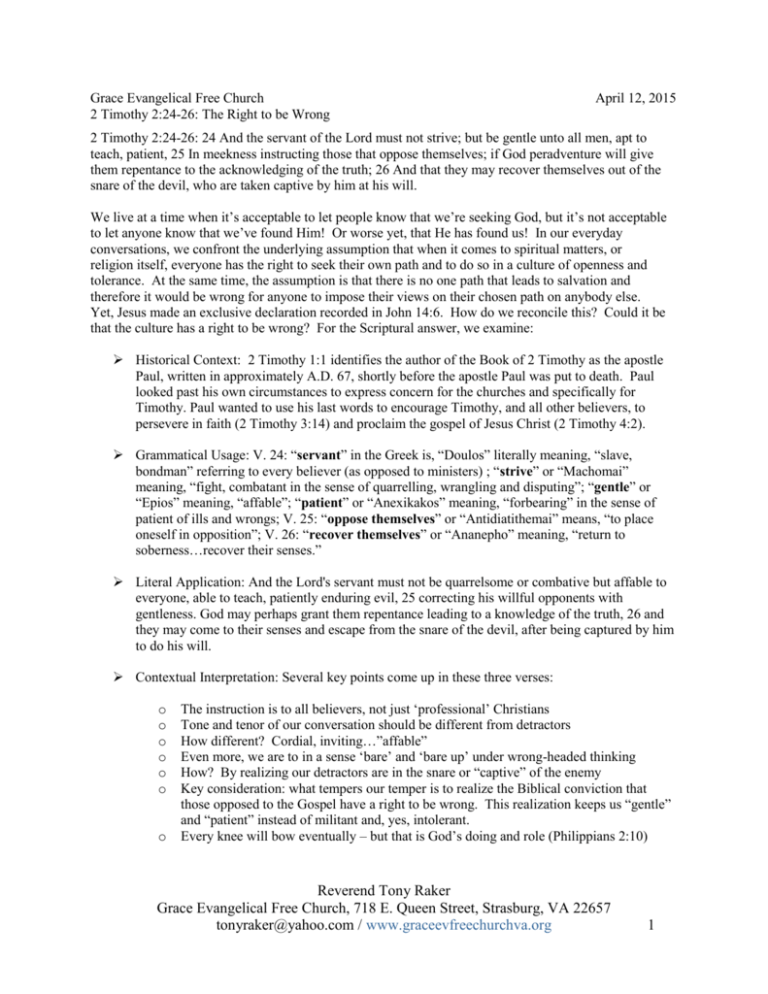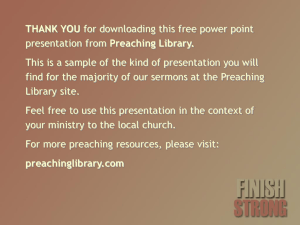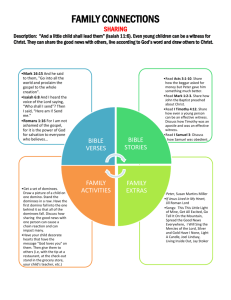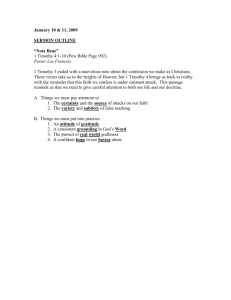2 TIM 2 24 26 (The Right to be Wrong)
advertisement

Grace Evangelical Free Church 2 Timothy 2:24-26: The Right to be Wrong April 12, 2015 2 Timothy 2:24-26: 24 And the servant of the Lord must not strive; but be gentle unto all men, apt to teach, patient, 25 In meekness instructing those that oppose themselves; if God peradventure will give them repentance to the acknowledging of the truth; 26 And that they may recover themselves out of the snare of the devil, who are taken captive by him at his will. We live at a time when it’s acceptable to let people know that we’re seeking God, but it’s not acceptable to let anyone know that we’ve found Him! Or worse yet, that He has found us! In our everyday conversations, we confront the underlying assumption that when it comes to spiritual matters, or religion itself, everyone has the right to seek their own path and to do so in a culture of openness and tolerance. At the same time, the assumption is that there is no one path that leads to salvation and therefore it would be wrong for anyone to impose their views on their chosen path on anybody else. Yet, Jesus made an exclusive declaration recorded in John 14:6. How do we reconcile this? Could it be that the culture has a right to be wrong? For the Scriptural answer, we examine: Historical Context: 2 Timothy 1:1 identifies the author of the Book of 2 Timothy as the apostle Paul, written in approximately A.D. 67, shortly before the apostle Paul was put to death. Paul looked past his own circumstances to express concern for the churches and specifically for Timothy. Paul wanted to use his last words to encourage Timothy, and all other believers, to persevere in faith (2 Timothy 3:14) and proclaim the gospel of Jesus Christ (2 Timothy 4:2). Grammatical Usage: V. 24: “servant” in the Greek is, “Doulos” literally meaning, “slave, bondman” referring to every believer (as opposed to ministers) ; “strive” or “Machomai” meaning, “fight, combatant in the sense of quarrelling, wrangling and disputing”; “gentle” or “Epios” meaning, “affable”; “patient” or “Anexikakos” meaning, “forbearing” in the sense of patient of ills and wrongs; V. 25: “oppose themselves” or “Antidiatithemai” means, “to place oneself in opposition”; V. 26: “recover themselves” or “Ananepho” meaning, “return to soberness…recover their senses.” Literal Application: And the Lord's servant must not be quarrelsome or combative but affable to everyone, able to teach, patiently enduring evil, 25 correcting his willful opponents with gentleness. God may perhaps grant them repentance leading to a knowledge of the truth, 26 and they may come to their senses and escape from the snare of the devil, after being captured by him to do his will. Contextual Interpretation: Several key points come up in these three verses: o o o o o o o The instruction is to all believers, not just ‘professional’ Christians Tone and tenor of our conversation should be different from detractors How different? Cordial, inviting…”affable” Even more, we are to in a sense ‘bare’ and ‘bare up’ under wrong-headed thinking How? By realizing our detractors are in the snare or “captive” of the enemy Key consideration: what tempers our temper is to realize the Biblical conviction that those opposed to the Gospel have a right to be wrong. This realization keeps us “gentle” and “patient” instead of militant and, yes, intolerant. Every knee will bow eventually – but that is God’s doing and role (Philippians 2:10) Reverend Tony Raker Grace Evangelical Free Church, 718 E. Queen Street, Strasburg, VA 22657 tonyraker@yahoo.com / www.graceevfreechurchva.org 1 Scriptural Comparison: The ‘right to be wrong’ conviction has its basis in both the Old Testament and New Testament, with specific instruction within the New Testament as to our view and attitude. o The clearest Old Testament basis is found in Joshua 24:14, 15: “And if it is evil in your eyes to serve the Lord, choose this day whom you will serve, whether the gods your fathers served in the region beyond the River, or the gods of the Amorites in whose land you dwell. But as for me and my house, we will serve the Lord.” These two verses place the decision squarely up to Israel. They must choose between serving the pagan gods of their early ancestors which the patriarchs (some of them) worshipped beyond the Euphrates River, or the gods of the Amorites whom Jehovah had driven out of their land to provide an inheritance for Israel, or they must choose Jehovah. o Deuteronomy 30:19: “I call heaven and earth to witness against you today, that I have set before you life and death, blessing and curse. Therefore choose life, that you and your offspring may live….” An alternative is presented by God: life and good vs. death and evil--good and happy, or a disobedient and miserable life. We know that love of God and compliance with His will are the only ways of securing blessings and avoiding the evils described. The choice was left to them, and in urging upon them the inducements to a wise choice, Moses warmed as he proceeded into a tone of solemn and impressive earnestness similar to that of Paul to the elders of Ephesus (Acts 20:26, 27). o In the New Testament, the encounter of Jesus Himself and the rich young ruler is most instructive as, “Jesus said to him, ‘If you would be perfect, go, sell what you possess and give to the poor, and you will have treasure in heaven; and come, follow me.’ 22 When the young man heard this he went away sorrowful, for he had great possessions” (Mt. 19:21, 22). The young man had made an idol of his wealth and loved it more than God. He had not kept the commandments from his youth, nor had he kept them at all. He rejected even this last opportunity to do good with his treasures and seek his salvation by obeying God, choosing instead to turn away from the Savior and not renew his inquiry about eternal life. He probably never returned. Notice the Lord Himself not just allowed but insisted a choice be made. In fact, the Lord’s attitude was in alignment with our text: affable, patient, gentle lending to an explanation of the truth leading to a decision. Conclusion: Our age is attempting to understand itself and human life without the aid of God’s revelation. This is a step toward the fulfillment of the prophecies in the Bible. Paul says that in the end times people will be “lovers of self” (2 Timothy 3:3). Peter mentions that a hallmark of the last days will be the presence of “scoffers” and skeptics (2 Peter 3:3), and Jude echoes the warning (Jude 1:18). Our culture with its emphasis on self-expression and self-fulfillment – “self” leaving no room for and therefore the rejection of God, has nudged humanity that much closer to the final judgment according to prophecy. Our Biblical understanding as to what and why this is happening, coupled with Biblical conviction of our actions and reactions not only insulates us from delivering the Gospel as a hammer instead of good news, but tempers us by knowing each individual is responsible for their own decision with respect to Jesus. As the Lord Himself, we do not yield on the gospel; we do yield to one’s consideration and ultimate decision regarding it. Reverend Tony Raker Grace Evangelical Free Church, 718 E. Queen Street, Strasburg, VA 22657 tonyraker@yahoo.com / www.graceevfreechurchva.org 2









